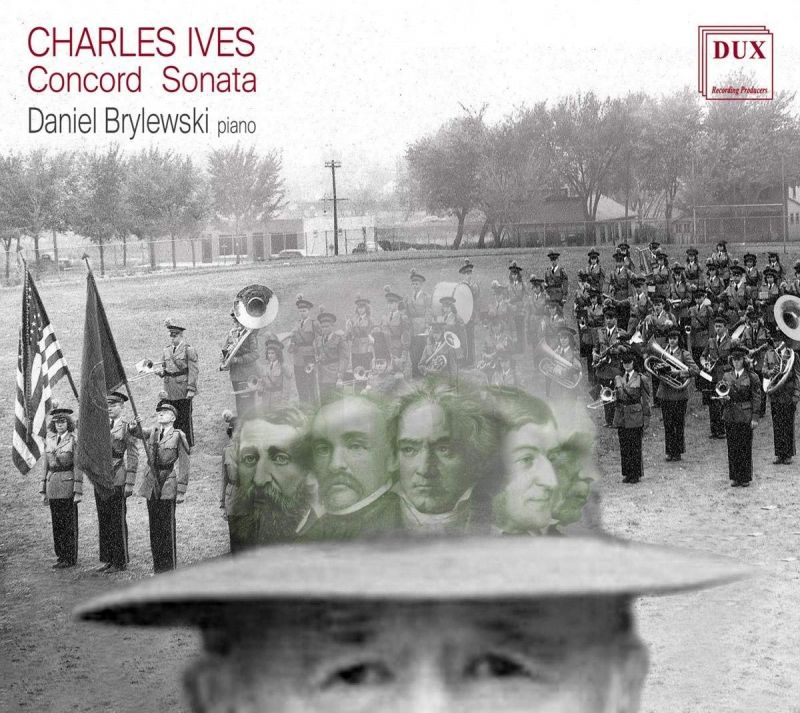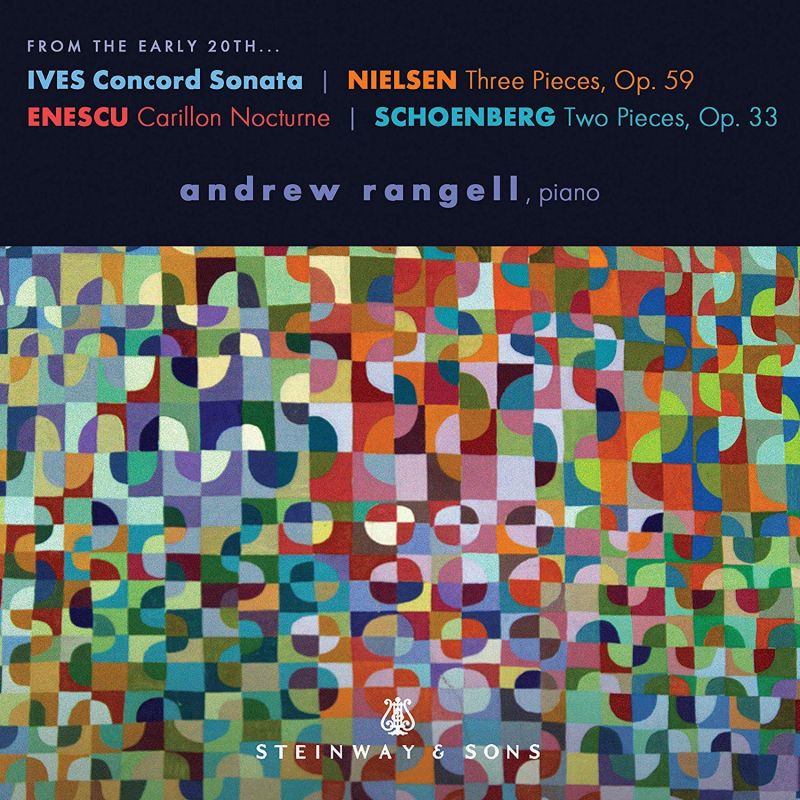IVES Sonata No 2 'Concord Mass' (Rangell; Brylewski)
View record and artist detailsRecord and Artist Details
Composer or Director: (Charles) Grayston Ives
Genre:
Instrumental
Label: Dux Recordings
Magazine Review Date: 10/2018
Media Format: CD or Download
Media Runtime: 49
Mastering:
DDD
Catalogue Number: DUX1313

Tracks:
| Composition | Artist Credit |
|---|---|
| Sonata No 2 "Concord Mass 1840-60" |
(Charles) Grayston Ives, Composer
(Charles) Grayston Ives, Composer |
Composer or Director: Carl Nielsen, George Enescu, Arnold Schoenberg
Genre:
Instrumental
Label: Steinway & Sons
Magazine Review Date: 10/2018
Media Format: CD or Download
Media Runtime: 44
Mastering:
DDD
Catalogue Number: 30100

Tracks:
| Composition | Artist Credit |
|---|---|
| (3) Pieces |
Carl Nielsen, Composer
Andrew Rangell, Piano Carl Nielsen, Composer |
| Carillon Nocturne |
George Enescu, Composer
Andrew Rangell, Piano George Enescu, Composer |
| 2 Pieces |
Arnold Schoenberg, Composer
Andrew Rangell, Piano Arnold Schoenberg, Composer |
Author: Jed Distler
Brylewski approaches Ives’s combative and convoluted keyboard-writing with a scrupulous eye and ear for detail, taking the opening ‘Emerson’ movement’s impulsive and sometimes contradictory tempo modifications on faith. Countermelodies emerge in clear perspective alongside clotted chords. The pianist’s care over slurred staccatos lends uncommon distinction to the passages in which they occur, while his unruffled command of the long chains of left-hand arpeggios conveys effortless sweep. Yet while Rangell doesn’t match Brylewski’s hyper-detailed control, he contrasts and characterises Ives’s rapid changes from petulant outbursts to lyrical tenderness more convincingly. Similarly, Rangell hurls into the rapid runs and syncopations in ‘Hawthorne’ with the improvisatory fervour one hears in Ives’s own piano playing on private discs, whereas Brylewski smooths out the edges, with every note in its exact place. In the central march, however, Rangell is rhythmically unsettled, while Brylewski’s rigid accuracy pales next to Jeremy Denk’s brisker, more idiomatic interpretation.
Rangell’s fidgety sense of timing undermines moments of simplicity and repose in ‘The Alcotts’, as well as Ives’s directives for when to press forward and hold back. Brylewski’s well-calibrated balances and finger-based legato keep the music’s spacious countenance at bay, in contrast to the more songfully inflected readings of Steven Mayer (Naxos) and Kirkpatrick (Sony). ‘Thoreau’ brings out the best in both pianists. Rangell beautifully taps into the movement’s narrative swings, despite his cavalier adherence to Ives’s time-tested dynamics (the ‘echo’ effects, for example, go for nothing). Brylewski allows the heavily scored broad passages enough room to resonate and makes an insidious transition into the first statement of the slow left-hand A C G ostinato (3'33" into the movement). Carolin Ralser’s lovely playing of the optional flute solo towards the end is miked at an appropriate distance, ‘across Walden Pond’, as it were. Rangell is the first and hopefully the last pianist on record to pucker his lips and whistle the flute part. Such cuteness cheapens one of Ives’s most inspired moments.
If anything, Rangell’s recreative intensity seems to merge more organically with his disc’s other selections. He wrings more angularity and harmonic tension from Nielsen’s imaginative Op 59 tryptich than anyone else on disc and gives shape and meaning to Enescu’s gorgeous evocations of distant bells, while, I might add, taking Enescu’s pianissimos more seriously than he does those of Ives! His arpeggiation of non-arpeggiated chords, though, seems mannered rather than purposeful. In comparison to relatively objective, ‘by the book’ renditions of Schoenberg’s Op 33 from Pollini (DG, 6/88), Lubimov (Vista Vera) and Jacobs (Nonesuch), Rangell’s interpretations are broader, more rhetorical and contrapuntally varied.
In short, the virtues and drawbacks of both Concord performances balance each other out. Neither, however, usurp Jeremy Denk’s bold and brilliant reference version, out of print on CD but available via download.
Discover the world's largest classical music catalogue with Presto Music.

Gramophone Digital Club
- Digital Edition
- Digital Archive
- Reviews Database
- Full website access
From £8.75 / month
Subscribe
Gramophone Full Club
- Print Edition
- Digital Edition
- Digital Archive
- Reviews Database
- Full website access
From £11.00 / month
Subscribe
If you are a library, university or other organisation that would be interested in an institutional subscription to Gramophone please click here for further information.





